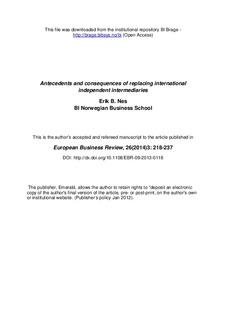| dc.description.abstract | Purpose – What characterizes the relationships with intermediaries that are soon to be replaced, and are the replacements successful? The paper aims to discuss these issues. Design/methodology/approach – The study applies a longitudinal design. The paper conducted a survey among a sample of exporters concerning their relationships with independent intermediaries in terms of trust, commitment, communication, control and two performance variables; financial performance and strategic goal achievement. Five years thereafter the author contacted the same companies again and questioned which independent intermediaries had been replaced in the period. The author then compared the replaced intermediaries with the extended intermediaries before they were replaced and analysed changes in the evaluations of the relationships and of the performance after the replacement. Findings – The relationships with terminated intermediaries that were replaced by sales subsidiary or home-based direct sales were characterized having higher trust, communication and control than extended relationships before replacement. While it may be surprising that these quite successful relationships were terminated, this is in line with internationalization process theories. The replacements, both intermediaries that were replaced by other intermediaries and by sales subsidiary/home-based direct sales, were highly successful in terms of improvement in performance and behavioural relationship variables. Research limitations/implications – The empirical findings are limited by the sample and by data collection from the principal only in the dyadic relations. Practical implications – International independent intermediaries should analyse the likelihood of being replaced by the principal because the relationship or the performance is unsatisfactory, but also because of satisfactory evaluations. Terminations of satisfactory relationships tend to be accompanied by change in operation mode to internal organization. The independent intermediary should in such cases build a defence structure against unwanted termination and/or prepare for buyout. The success of the replacements suggests that international marketers benefit from being proactive in replacing intermediaries with new intermediaries or with a hierarchal entry mode. Originality/value – This is the first study that applies most of these variables from interorganizational relations theory in the study of international independent intermediary replacements. It is also the first to give insight into the consequences of intermediary terminations. | nb_NO |
